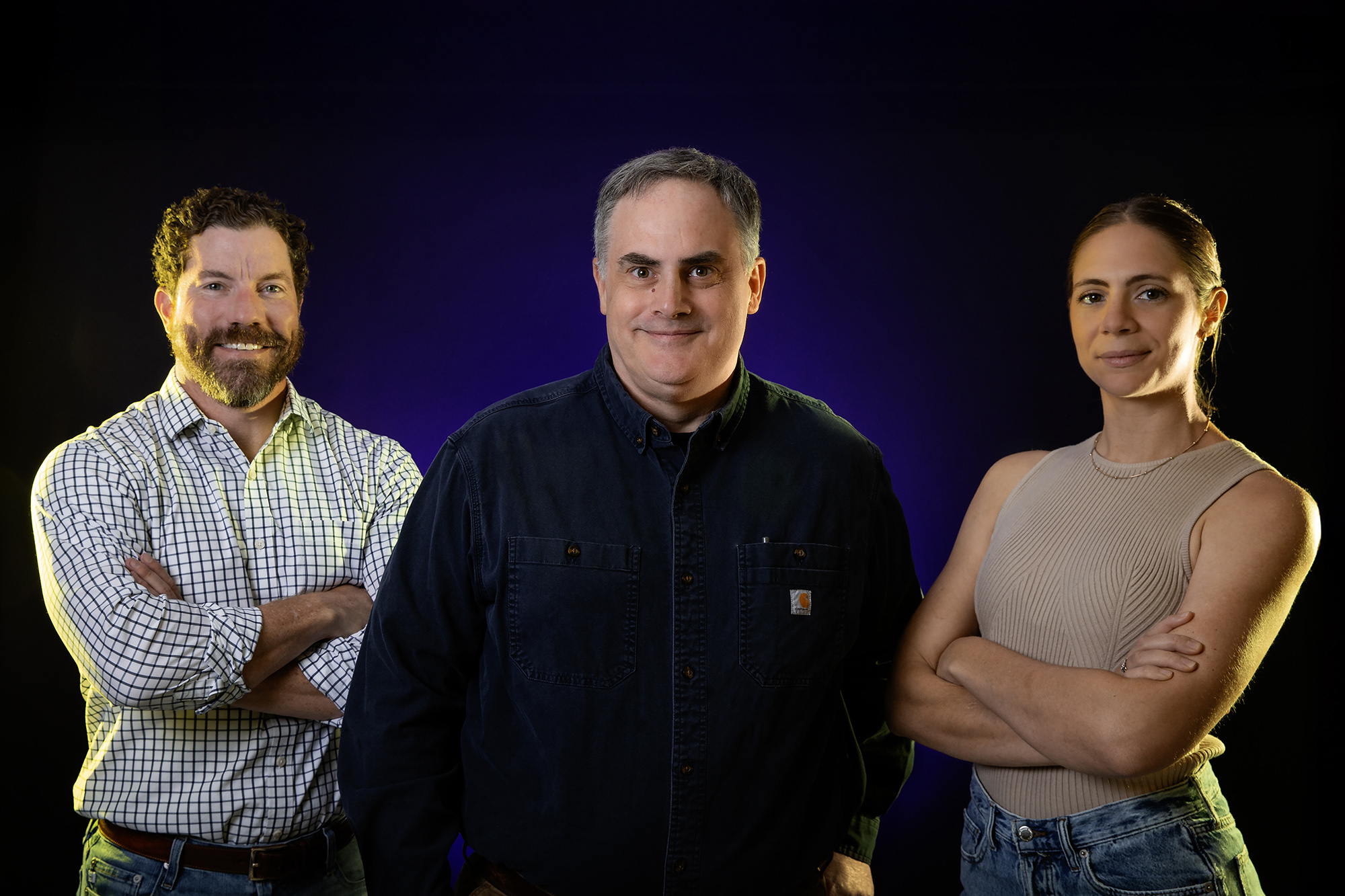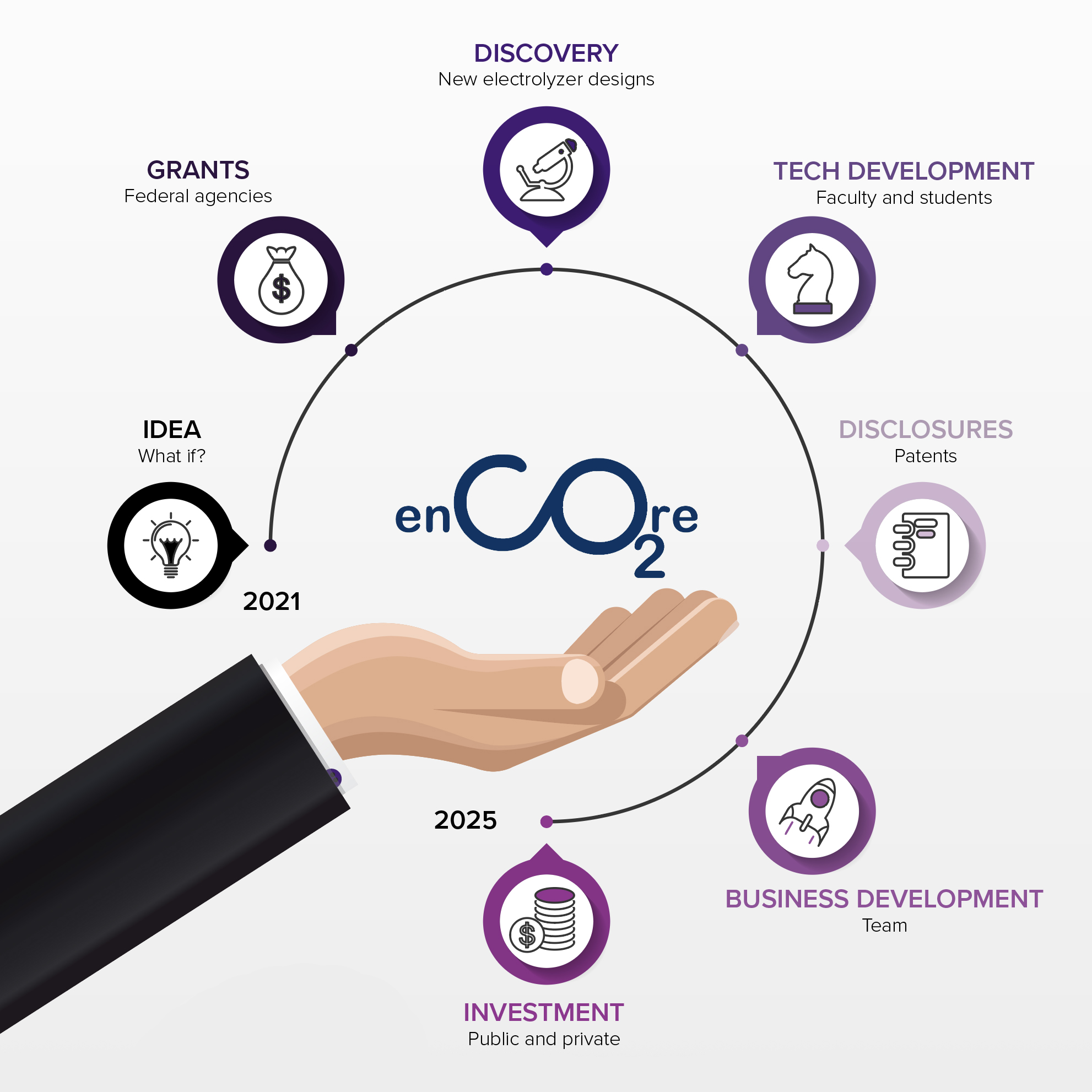Transforming “Made in America” Using CO2
July 01, 2025
Turning Waste into Value

The Encore team: William McGehee, John Flake, and Jordan Losavio. Photo by Katherine Seghers
Highly efficient electrolyzers developed at LSU can transform CO2 into the basic building blocks we need to make carbon-based products such as sunglasses, detergents, clothing, and food. Even a grapefruit hard seltzer is planned for Tin Roof Brewing in Baton Rouge, which is set to reopen soon as a brewpub.
“The hard seltzer is kind of a novelty, but it demonstrates that we can convert CO2 into products like ethanol,” said John Flake, LSU professor of chemical engineering and one of the founders of Encore, a Louisiana startup built on LSU technology.
This story could have started with how an LSU professor, his former student, and a local entrepreneur walk into a bar—but it was a local gym, Iron Tribe on Acadian Thruway.
“John and I had been going to the gym every day together for a while, and become friends,” said William McGehee, owner of Tin Roof Brewing and co-founder of Encore. “One day, he said, ‘You have a brewery, you make ethanol and emit CO2. Well, I have a technology that can take CO2 and turn it into ethanol.’ That’s where it all started.”
McGehee, who holds two degrees from LSU—a bachelor’s degree in finance and a law degree, saw an opportunity to turn his company’s waste into value.
“Shortly after that, we realized we needed another team member, and we were at the gym talking about it,” McGehee continued. “And John points to Jordan in front of us and says, ‘Well, you know, Jordan over there was my star student in chemical engineering.’ And I thought Jordan was a yoga teacher at the time.”
Jordan Losavio, born and raised in Baton Rouge, graduated with a bachelor’s degree in chemical engineering from LSU in 2013 and got a job in oil and gas. This took her to California, but Losavio, born Boudreau, looked to return home. She’s now back at LSU, wrapping up a Ph.D. in Human Nutrition, while building up Encore and talking about its unique technologies with chemical manufacturing companies and potential business partners.
“We forget legacy industries weren’t always legacy, and we want to be the next legacy industry,” Losavio said. “We want to partner with our leading energy industries as they’re investing in decarbonization, and instead of those innovations happening elsewhere, we want to create them here in Louisiana. We see the value of innovating here, implementing here, and growing here. Louisiana is the perfect spot.”

The evolution of Encore, from basic and applied research to the launch of a Louisiana startup.
– Illustration by Elsa Hahne
Losavio helped the Encore team win $200,000 in seed funding from FUEL, the statewide economic development engine for energy, led by LSU, which was awarded up to $160 million by the National Science Foundation last year. Those funds were then matched with $67.5 million from Louisiana Economic Development.
“With FUEL, it’s incredible to now be back in Louisiana and seeing so much startup support and a whole ecosystem being built around founders who are taking these really innovative technologies out of universities, like we’re doing, and bringing them out to solve problems locally and globally,” Losavio said. “When I was presented with this idea to work with Dr. Flake and William, I was immediately on board.”
Besides the proof-of-concept funding from FUEL, Encore won $50,000 at FUEL’s Super Pitch event in February.
“Encore is an example of the innovation potential available in Louisiana, and what happens when people are enabled to turn use-inspired research into a business,” said Mike Mazzola, executive director of FUEL. “Supporting startups like Encore is what FUEL is all about—championing innovators living and working in Louisiana to grow our energy industry and workforce.”
Tin Roof Brewing, which has been on hiatus since October, will soon reopen in its previous location as a brewpub. While ethanol, or alcohol, is one of the products Encore can make more efficiently using CO2, derivatives of other CO2 reduction products like ethylene and acetic acid have broader commercial applications and could be used to make carbon-neutral products with a much higher profit margin. Examples include packaging materials, clothing, and eyewear made from cellulose acetate.
“Conventional versions of these products are made from fossil feedstocks and have relatively high carbon intensities, meaning two to 10 times more CO2 is emitted relative to the weight of the product itself,” Flake said. “Meanwhile, our products can be carbon neutral or even carbon negative.”
Flake and his research colleagues have several patents pending on technologies Encore is working to commercialize, including copper-tin electrocatalysts, new ionomeric membranes, and new electrolyzer designs. Their goal is to scale the technologies while driving efficiency. At a high level, innovations in electrolytic CO2 conversion could eventually lead to replacing all fossil-based products with products made from CO2. Even carbon products like medicines and food could be made more efficiently through CO2 conversion.
“It’s a little crazy to think I’m now involved in something that could change the world. Almost everybody in our space who are doing these tech startups are coming from MIT and Stanford. It makes me proud to show that people from Louisiana can do this, that LSU can do this. Working as a team, we’re doing something great with people we like.”
William McGehee, co-founder of Encore and owner of Tin Roof Brewing
Louisiana is unique in the nation when it comes to carbon and chemical manufacturing. While two-thirds of national carbon emissions come from transportation and power generation—both of which can happen almost entirely without carbon—about two-thirds of Louisiana’s carbon emissions come from industries that make carbon-based products. Recycling that CO2 into essential products provides a workable alternative to sequestration in the industry-wide commitment to reach net-zero emissions by 2050 or earlier.
At this year’s CERAWeek, which gathered energy executives and industry, automotive, manufacturing, and technology leaders in Houston, Texas, Jordan Losavio represented Encore sitting next to Amy Odom, site development and technology leader at BASF.
“I applaud the efforts of Encore,” Odom said. “There are some great niche markets that will take advantage of these emerging technologies, and I could see them possibly co-locating with an industry partner to use their CO2.”
But first, there’s ethanol and a hard seltzer to make, and Tin Roof Brewing and Encore are getting right on it with support from a $275,000 Small Business Innovative Research, or SBIR, Phase 1 grant from the National Science Foundation.
Next Step
Discover stories showcasing LSU’s academic excellence, innovation, culture, and impact across Louisiana.


